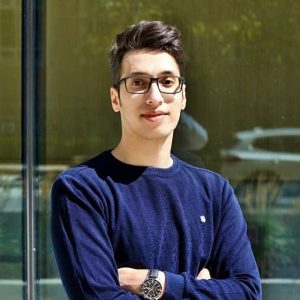Farshad Tajddinisarvestani is a Work Study Student for the Digital Humanities Project. Farshad is currently a PhD student at the University of Toronto, specializing in the fields of mechanical and industrial engineering. His research revolves around the fascinating realm of data-driven modeling, In-Silico experiments, and In-Vivo visualization of cardiovascular flows using cutting-edge techniques such as medical imaging, patient-specific and physics-based simulations, reduced order modelling, and machine learning. In his work on the Digital Humanities Project, Farshad utilizes artificial intelligence (AI) and natural language processing (NLP) techniques to unlock valuable insights and facilitate novel approaches to understanding various aspects of the works of Persian poets.
“I have been a work-study participant at the Elahé Omidyar Mir-Djalali Institute of Iranian Studies since the summer of 2023. During my tenure, I have had the privilege of contributing to two significant projects: Cinema Iranica and the application of Natural Language Programming (NLP) and Machine Learning in Women Poet. My role has involved diverse tasks, including collecting interviews from multiple Persian directors for the Cinema Iranica archives, crafting titles and introductions for these interviews, designing posters, and enhancing the resolution of video previews.
One of the most fulfilling aspects of my experience has been the collaborative nature of our work. Together with my team, we navigated various challenges, from finding interviews to refining technical aspects like image resolution. These experiences underscored the importance of effective teamwork and problem-solving, enriching my understanding of project management and fostering invaluable camaraderie within our group.
Individually, my time at the Institute has been transformative. Through hands-on involvement in projects, I honed skills in NLP, OCR, and pattern recognition, which are pivotal in today’s digital landscape, and will be helpful for my future career. Watching interviews with renowned Persian directors such as Abbas Kiarostami and Bahram Beizaei has been an enlightening experience for me. It is provided invaluable insights into their unique perspectives on the world, broadening my understanding of cinema. Exploring poetry has long been a personal hobby of mine, and participating in the work-study program has allowed me to immerse myself even further in the world of Persian poetry. This opportunity has deepened my appreciation for the art form, enriching my understanding of its nuances and cultural significance. Moreover, engaging with esteemed figures like Nasrin Ebadi during our event management endeavors broadened my perspective and provided networking opportunities crucial for my professional growth.
My journey with the Institute has not only equipped me with practical skills but also instilled a profound sense of purpose. It has been a cornerstone in my academic and professional development, empowering me to contribute meaningfully to the intersection of technology and humanities. The Institute’s commitment to fostering interdisciplinary collaboration and cultural understanding exemplifies its pivotal role as a catalyst for positive change in the academic landscape.”
